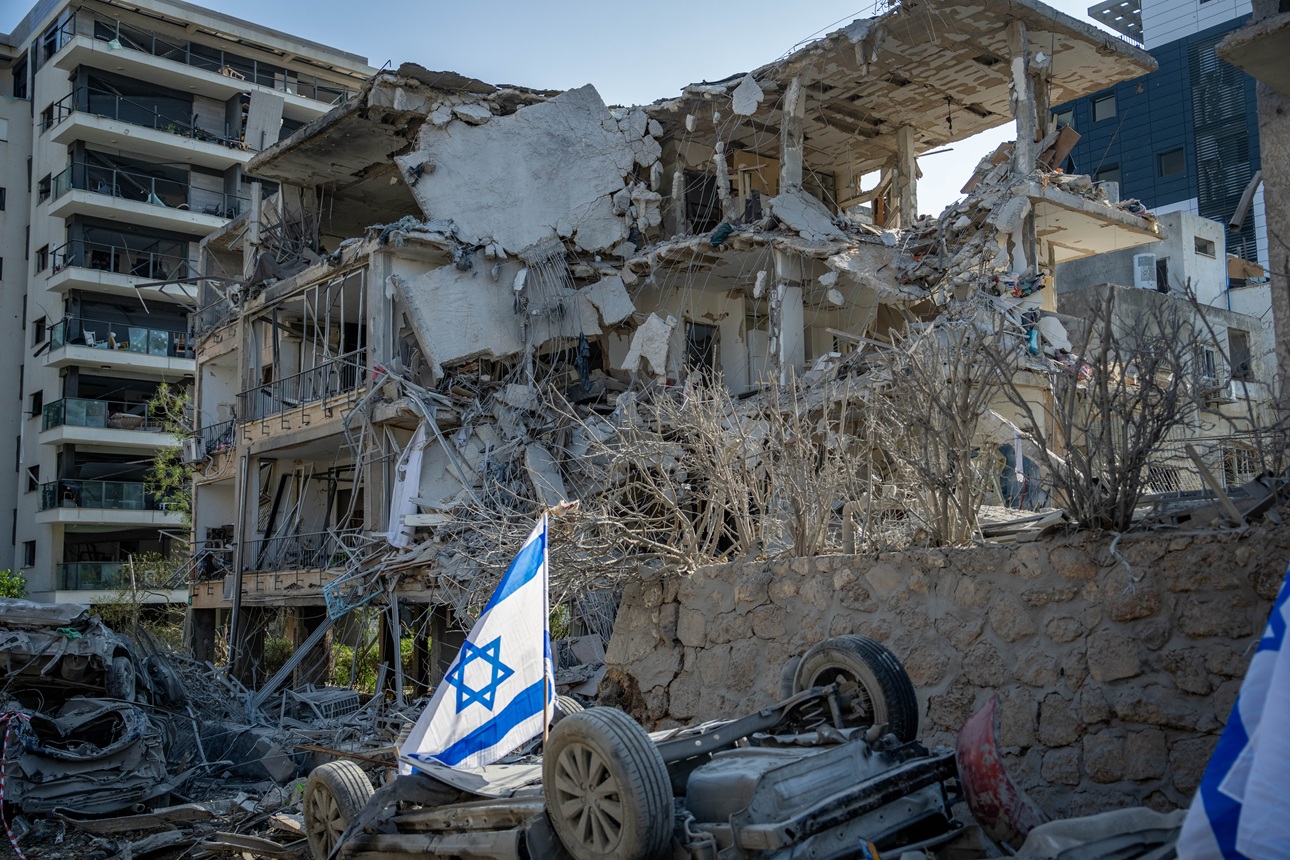Israelis United in Confronting Iran - What's at Stake Next?

Photo by Erik Marmor/Flash90
Dear Friends,
Since the 1990s, Israeli leaders from Yitzhak Rabin to Benjamin Netanyahu have been warning that Israel would not tolerate a nuclear Iran. In the early hours of Friday June 13th, the blare of a siren announced that the time to act had come.
As a flash survey we conducted this week showed, few issues enjoy as much broad support among Israelis as the necessity of confronting Iran. Here is why so many believe that now is the time to act.
There is a deep-seated understanding among Israelis that the primary lesson of the October 7 attacks is that when our enemies declare that they intend to destroy us, and actively pursue the means to do so, we must take them at their word. For too many years our military and political leaders watched as Hamas and Hezbollah built up their capabilities while issuing threats of annihilation. Wary of the costs of war, our leaders placed their faith in deterrence. That faith proved disastrously unfounded on October 7th, 2023.
But Hezbollah and Hamas were merely proxies of Iran. The real threat, it was understood all along, emanated from Iran, with its vast ballistic missile arsenal and expansive nuclear program. In the post-October 7th reality, faced with a threat infinitely more dangerous, Israel's leaders had no choice but to remove the threat by any means possible.
There is a debate among intelligence experts about just how close Iran was to deciding it wanted to make the last crucial steps needed to become a nuclear power. But in some ways this argument is academic. Almost all the experts agree that once the decision is made, it would be weeks before they could obtain nuclear weapons. Whether they would make this decision in a number of weeks, months, or even a year or two – this is not a reality that Israel can live with.
This is why any Israeli leader, whether Benjamin Netanyahu, Naftali Bennett or Yair Lapid, would have been expected to act at this moment. And so, Israelis have rallied behind this government, despite its unpopularity, because they perceive it to be doing the right thing against an existential threat.
It is of course too early to know how this will all turn out. There is no doubt that the first week of this war has been a military success. But what comes next – how the war ends – is unclear and just as consequential.
Most obviously, if the war fails to set back Iran’s nuclear program substantially, let alone if it precipitates a dash towards a bomb, it will be deemed a strategic failure. Whether or not Israel’s military operation facilitates regime change in Iran (in the short or long run) or leads to further entrenchment of the regime is another big question looming over the conflict.
But as I have been saying for almost two years now, we must not lose sight of what may arguably be the most important strategic opportunity facing Israel since October 7th: the opportunity to restart our democracy and rebuild Israel from the inside so that it can emerge stronger from this ordeal and well prepared for the challenges of the coming decades.
Unfortunately, Israel entered this phase of the war severely weakened on its critical domestic front. In the months leading up to the attack on Iran, Israel's leaders did not take advantage of the sense of unity and solidarity that emerged after Hamas' attacks, instead returning to the divisive policies that preceded October 7. As the IDF prepared to strike Iran, the government was preoccupied with highly controversial efforts to fire the Attorney General, dismiss the Shin Bet Chief, and legislate a blanket exemption from military service for ultra-Orthodox men.
The latest step in this legislative process took place under threats from Haredi politicians that they might vote to dissolve the Knesset and send the country to early elections if their demands were not met. Prime Minister Netanyahu and his political partners agreed to these demands while they knew an attack on Iran was imminent, and with it additional call ups for the reservists who have already been stretched thin since the outbreak of the war.
The next few weeks are full of pitfalls, but also significant opportunities. As time goes on, there is a risk that hubris will lead to 'mission creep' and cause us to lose sight of the reasons we struck Iran in the first place. Most Israelis would welcome the fall of the Ayatollah's regime, but we must not forget that Israeli (not to mention recent American) attempts at regime change have not ended well, and there is no guarantee that Iran's leaders would be replaced with a more moderate leadership.
Our leaders must also remember that as successful as our military strikes will be, there is a limit to how much kinetic actions can set back Iran's nuclear program. Whether it is by a few months, or more optimistically by a year or two, some sort of political and diplomatic framework will be needed to build on our military victories and ensure an end to Iran’s nuclear ambitions for many years—and ideally forever.
The successful removal of the Iranian threat could liberate the entire region to continue down the path of peace and cooperation charted by the Abraham Accords. More immediately, it could lead to an end to the war in Gaza and the return of the remaining hostages held by Hamas. Just as importantly, it could usher in a period of unity, shared purpose and badly needed reform at home.
The events of the past few years should remind us all how dangerous internal divisions are for a country as vulnerable as Israel, but also how much we are able to achieve when we are united and set our minds to it.
Yours,

Yohanan Plesner
President
The Israel Democracy Institute
